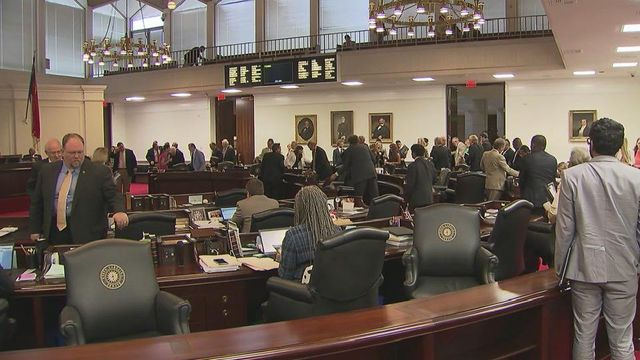Education tops debate during first Senate budget vote
The bill passed 33-16 Tuesday night and will remain on the calendar for a second vote Wednesday.
Posted — UpdatedThe bill passed 33-16, and a final vote is set for Wednesday.
Senate President Pro Tem Phil Berger said the budget establishes a rainy day fund that will be at an all-time high and reduces taxes for all payers of income tax, with focus on those at the end of the income spectrum.
"I think this budget responsibly controls year-over-year spending growth," he said.
The final budget adopts a Senate plan to expand the personal exemption, income on which North Carolinians pay no taxes. For a married couple filing jointly, that personal exemption expands from $15,500 to $16,500 for the current tax year and then to $17,500 for the next tax year.
Senator Harry Brown, R-Onslow, said that, within two years, North Carolina will rank No. 1 in the Southeast for teacher pay.
"I think that’s a pretty good program. I don’t know how you can argue with that," he said.
Despite increases for teachers, some senators expressed concern that the budget does not include enough funding for education and early childhood programs.
“There is a lot of this budget that places a priority on pet projects over people,” said Sen. Erica Smith-Ingram, D-Northampton.
Some said that education and early childhood programs should have been funded over other projects included in the budget, while Smith-Ingram specifically noted that five early colleges that were approved to request funding in December were not included in the final budget.
All state workers would get a 1.5 percent pay increase under the plan, plus a 0.5 percent bonus. The budget also sets aside a merit pay fund equivalent to 1 percent of state worker salaries that will be distributed based on performance.
State retirees will not get a cost-of-living increase but instead will see a 1.6 percent one-time bonus. This is a compromise between House members, who wanted a cost-of-living increase, and senators who said a permanent rise in pension benefits would be too costly.
House Speaker Tim Moore said Monday that the House has tentatively planned to vote on Thursday and Friday, but that schedule could move up to Wednesday and Thursday votes if Democrats agree to the change.
Related Topics
• Credits
Copyright 2024 by Capitol Broadcasting Company. All rights reserved. This material may not be published, broadcast, rewritten or redistributed.






